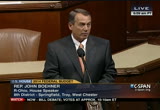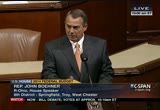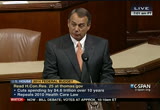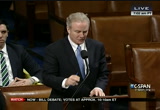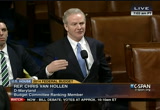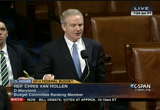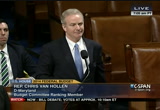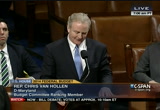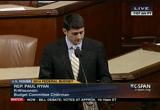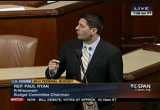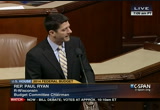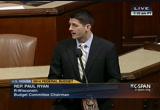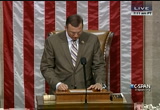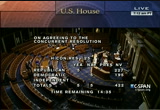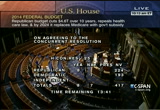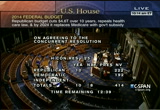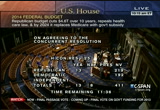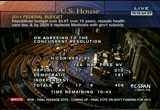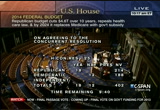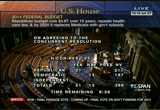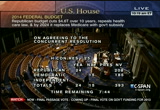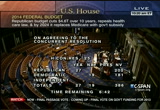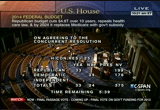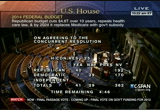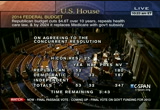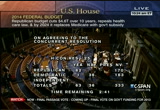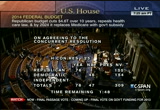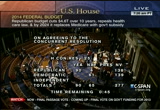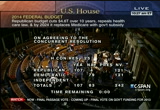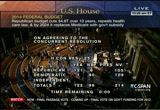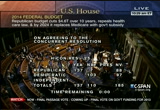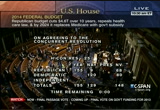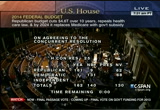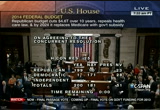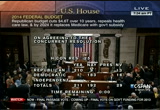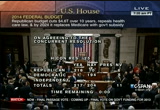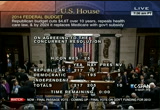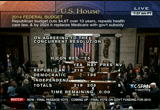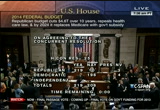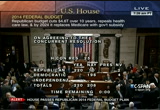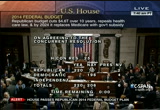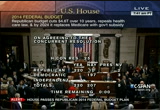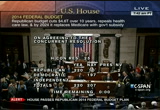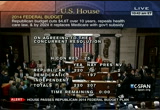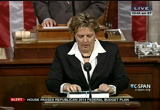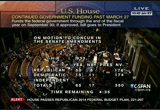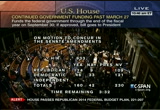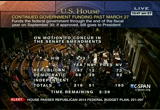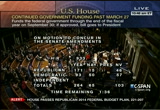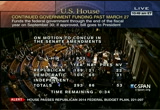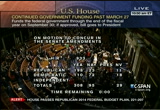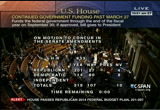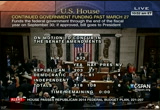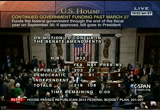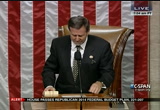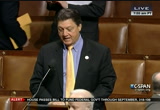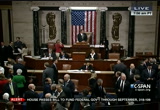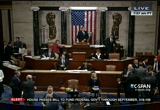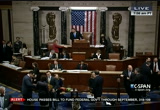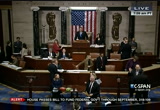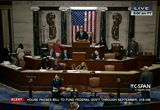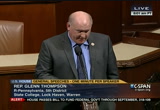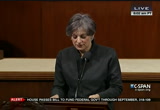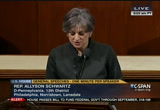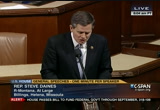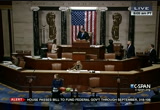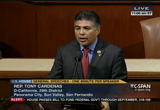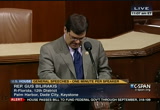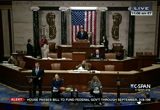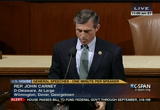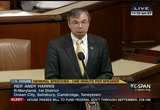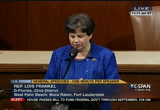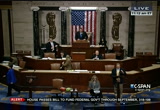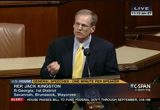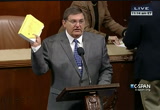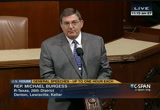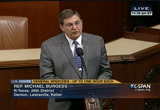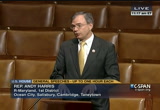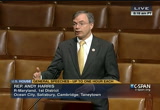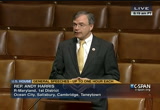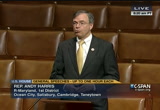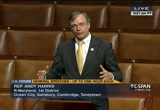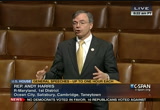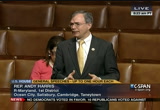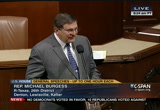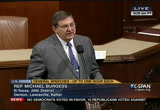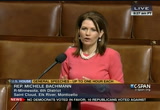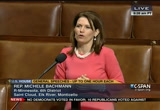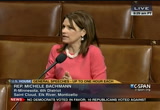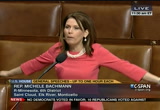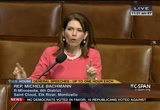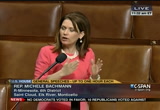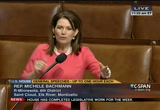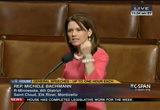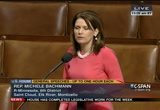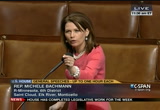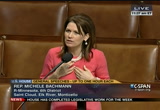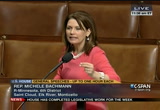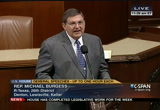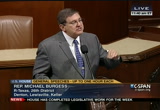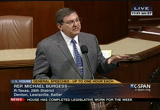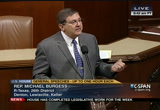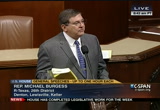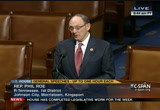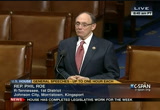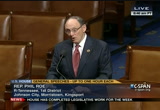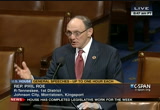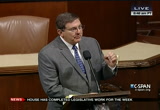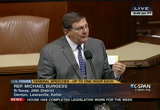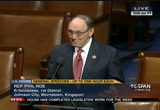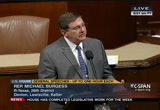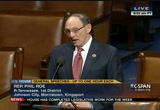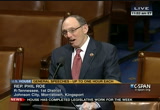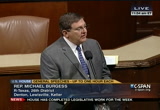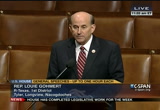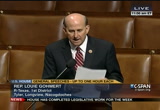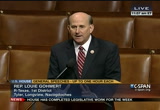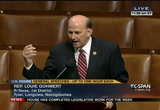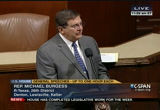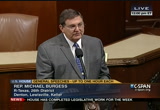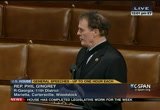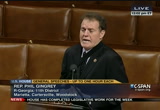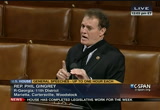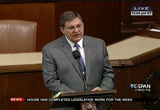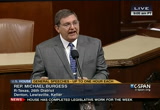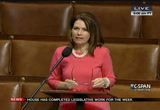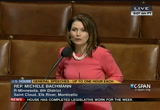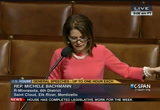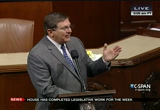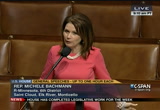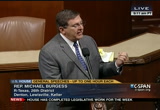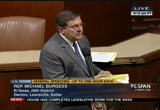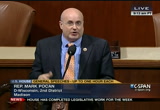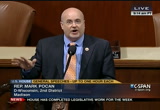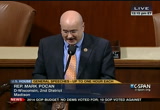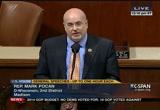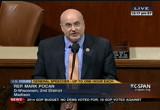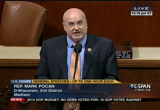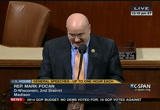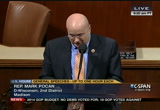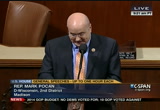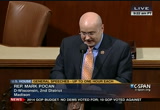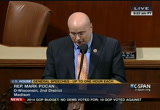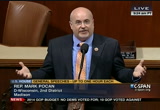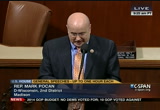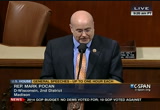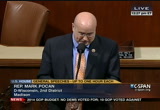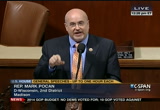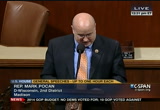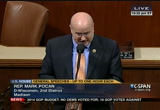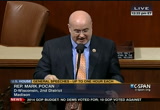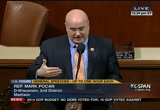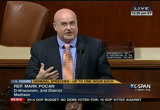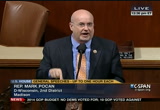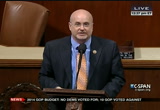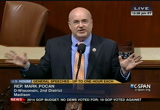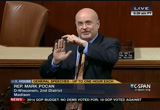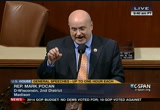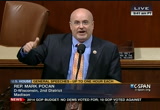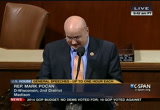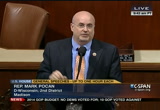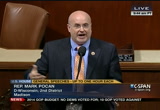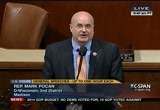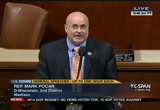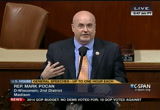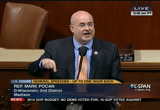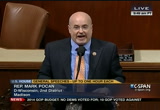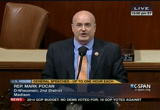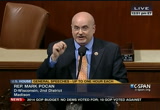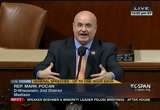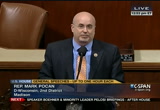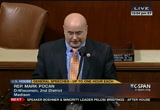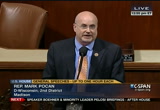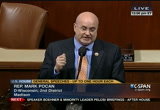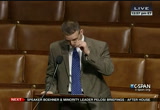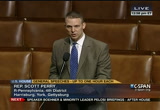tv Public Affairs CSPAN March 21, 2013 10:00am-1:00pm EDT
10:00 am
for a job well-done. a budget here that will in fact balance over the next 10 years. and having a debate with our colleagues across the aisle and across the building and downtown who all have budgets that never come to balance. i don't know where this balanced plan can be called a balanced plan if we never get to balance. this budget does more than just balance. it helps improve the lives and addresses the americans people and addresses things that are important to american families. you know, fixing the tax code, lowering the rates means more jobs and higher wages for the american people. voting for this budget means voting for the keystone pipeline. american-made energy means more jobs and lowering energy prices for the marn people.
10:01 am
supporting patient-centered reforms means more jobs and lower health care costs for the american people. and protecting and strengthening medicare meeds a secure retirement for older americans. cutting waste means more airness and accountability for hardworking taxpayers. doing this means preserving the american dream, which is what we were sent here to do. we've balanced the budget before. 1997, republican congress working with a democrat president, bill clinton, came together to put the plan that would in fact balance the budget and we did. for four years ran a budget surplus. the president has an opportunity during this critical debate to come forward and to help make this part of his legacy like it has become part of the clinton legacy. working together on behalf of the american people to solve what we know is a crisis in our country. we can't continue to spend money that we don't have.
10:02 am
it's as simple as that. when you spent more money than you brought in for 50 of the last 60 years, no american family can do this, no american business can do this, no government can do this without bringing on a debt crisis that is sure to imperil the future of our kids and grandkids. vote for the ryan budget. i yield back. the chair: the gentleman's time has expired. who seeks time? mr. van hollen: i reserve the balance of my time. the chair: the gentleman from maryland reserves his time. mr. ryan: i reserve the time since i have the right to close. we have no more speakers. the chair: the gentleman from maryland is recognized for 3 1/2 minutes. mr. van hollen: thank you, mr. speaker -- mr. chairman. i'm going to urge our colleagues to vote against this republican budget for a variety of reasons.
10:03 am
first of all, this is an uncompromising ideological approach to our budget issues. we've just been through a major national campaign. where both presidential candidates, president obama, governor romney, agreed on one thing and that was that the people of this country faced a fundamental choice in the direction we were going to take. and the american people voted and they resoundedly rejected the approach that is now taken once again for the third year in a row in this republican budget. this budget, as we've heard over the last couple days, fails on a number of counts. number one, it adopts the european style austerity approach that we've seen slow down economies in many parts of
10:04 am
europe. we should instead be focusing on job growth and putting people back to work rather than a budget like this budget which will result in 750,000 fewer americans working by the end of this year. that's according to the independent nonpartisan congressional budget office. and it will result in more than two million fewer people working next year. it also fails the test of taking a balanced approach. because it is founded on the failed idea that combiffing another round of tax cuts to people at the very high end of the income scale will somehow trickle down and lift up all the other votes. but we know that hasn't worked and yet it is pursued once again such that everybody in e republican is asked to folks at the pt
10:05 am
top. we offered, we democrats offered an amendment in the budget committee to say don't increase taxes on middle class americans and all the republican colleagues voted no. it it is based on the idea that we should dramatically cut investments that are important to help our economy grow. we know we have an aging infrastructure problem. we know we need to modernize our national infrastructure to compete in the global economy. and yet this cuts our infrastructure and transportation budget by over 20% when we just got a grade of d-plus from the american society of civil engineers and when we have 15% unemployment in the construction industry. it makes it harder for students to go to college. the republican budget will double the student loan interest rate in july from 3.4% to 6.8%, and in the part of our
10:06 am
budget where we make important investments in science and research and education, it more . an doubles the sequester cut it violates important commitments we've made to our seniors. it reopens the prescription drug doughnut hole so seniors with high health care costs will pay thousands more during the period of this budget. it turns medicare into a voucher program so seniors face the risk of rising health care costs. and finally, mr. chairman, it's based on this false idea that you can claim to balance the budget in 10 years when you claim also to be getting rid of obamacare when all they do is get rid of the benefits of obamacare. this reached the time of balance because they keep the affordable care act, obamacare. i urge my colleagues to reject this approach and to adopt the balanced democratic approach to dealing with these national challenges. the chair: the time of the gentleman has expired. the gentleman from wisconsin is recognized for 3 1/2 minutes. mr. ryan: i yield myself such
10:07 am
time as i may consume. the chair: the gentleman is recognized. mr. ryan: mr. chairman, this budget is constructive. it reveals each side's priorities. it clarifies the divide that exists between us. we want to balance the budget. they don't. we want to restrain spending. they want to spend more money. we think taxpayers have given enough to washington. they want to raise taxes by at least $1 trillion. take more to spend more. we want to shrinken programs like medicare. they seem to be complicit with its demise. we see obamacare as a roadblock to patient-centered health care reform and they see it as a sacred cao. we think -- sacred cow. they want to hallow out our military. we offer modernization, reform, growth and opportunity. they are clinging to the status quo -- more taxing, more
10:08 am
spending, more borrowing. this plan recognizes that if we cannot control our out-of-control debt we will lose control of our future. we cut wasteful spending and we balance the budget. this plan recognizes that concern for the poor is not measured by how much money we spend in washington but instead how many people we get out of poverty. we reform anti-poverty programs so they work. we help strengthen communities and families. we recognize the need for a vibrant economy. the stanford economists that looked at this budget last week said 500,000 jobs right away. $1,500 more in take-home pay for families in one year. 1.7 million jobs and $4,000 for families in the 10th year. this plan will protect and strengthen medicare, and it begins, yes, by repealing
10:09 am
obamacare, because that does great damage to medicare. again, again, the house is leading the way. we have a jobs deficit. we have a budget deficit. and these are the byproducts of a leadership deficit. we still have no budget from the president, in violation of the law. he gets his ncaa bracket in on time but still no budget. this is the fourth time in five years. he set a new record this year, two months with no plan, while we had trillion-dollar deficits and a debt crisis on the horizon. his party leaders, unfortunately, failing offering a serious account of our challenge. no serious plan to grow our economy or create jobs. no plan to ever balance the budget. take more. trillions of dollars more to spend more in washington. that's what got us in this mess in the first place. so what can be done?
10:10 am
the good news is that we now have a vehicle for regular order. the democrats derailed the budget process each of the last few years and stopped governing when they stopped budgeting. at least we now have a budget process that's moving. we brought them back in the game this spring. that's a good thing. so what's going to happen in the weeks ahead? well, we will make the case for our priorities. whether the gentleman from maryland wants to acknowledge it or not, we have divided government. the american people elected a republican majority in the house, and our job is to make the case for our policies, find common ground where it exists and see if we can make this divided government work, and that is what we intend to do. we owe the american people a responsible balanced budget. that's what we are delivering today, and i urge support of this resolution. the chair: the time of the gentleman has expired. all time for debate has expired. under the rule the committee rises.
10:11 am
the speaker pro tempore: mr. chairman. the chair: mr. speaker, the committee of the whole house on the state of the union having had under consideration house concurrent resolution 25 and pursuant to house resolution 1 2 i report the -- 1 2 i report the con-- 122 i report the concurrent resolution back to the house. the speaker pro tempore: the chairman of the committee of the whole house on the state of the union reports that it has had under consideration house resolution 25 and pursuant to house resolution 122 reports the concurrent resolution back to the house. the question is on adoption of house resolution -- house concurrent resolution 25. under the rule, members will record their votes by
10:12 am
electronic device. pursuant to clause 8 of rule 20 and the previous order of the house, this is a 15-minute vote on the adoption of house concurrent resolution 25 and will be followed by five-minute votes with a motion to concur with the senate h.r. 933 and approval of the journal, if ordered. this is a 15-minute vote. [captioning made possible by the national captioning institute, inc., in cooperation with the united states house of representatives. any use of the closed-captioned coverage of the house proceedings for political or commercial purposes is expressly prohibited by the u.s. house of representatives.]
10:44 am
the speaker pro tempore: on this vote the yeas are 221. the nays are 207. the concurrent resolution is agreed to. the unfinished business is the vote on the motion to concur on h.r. 933 offered by the gentleman from kentucky, mr. rogers, on which the yeas and nays were ordered. the clerk will redesignate the motion. the clerk: h.r. 933, an act making appropriations for the department of defense, department of veterans affairs, and other departments and agencies for the fiscal year ending september 30, 2013, and
10:45 am
or other purposes. the speaker pro tempore: the question is on the motion to concur. members will record their votes by electronic device. this is a five-minute vote. [captioning made possible by the national captioning institute, inc., in cooperation with the united states house of representatives. any use of the closed-captioned coverage of the house proceedings for political or commercial purposes is expressly prohibited by the u.s. house of representatives.]
10:54 am
10:55 am
speaker's approval of the journal which the chair will put de novo. the question is on agreeing to the spomplee of the journal. -- speaker's approval of the jurem. so many as are in favor say aye. -- journal. so many as are in favor say aye. those opposed, no. in the opinion of the chair, the ayes have it it. the journal stands approved. for what purpose does the gentleman from georgia rise? >> i ask unanimous consent that when the house adjourns today it adjourn to meet at 10:00 a.m. on monday, march 25, 2013. the speaker pro tempore: without objection, so ordered.
10:57 am
11:00 am
the speaker pro tempore: the chair will now entertain requests for one-minute peeches. he house will be in order. for what purpose does the gentleman from pennsylvania seek recognition? >> mr. speaker, i request unanimous consent to address the house for one minute and revise and extend. but the house is still not in order.
11:01 am
the speaker pro tempore: without objection, the gentleman from pennsylvania is recognized for one minute. he house will be in order. >> mr. speaker, the congressional research service, the nonpartisan research arm of congress recently issued a report confirming a startling trend over the last five years. mr. thompson: the production of oil and natural gas is down on federal lands and up on private lands. the increase from 2007 to 2012 that continues to make national headlines did not come from our national federal lands. the boom in shale gas production that's providing unprecedented economic opportunities across my district and continues to make national headlines did not come from federal lands. in fact, mr. speaker, natural gas production climbed 40% of state and private lands while falling about 33% of federal
11:02 am
lands. america's energy resurgence is before us today due to the innovation of our private sector. hardworking american men and women -- men and women from all walks of life but their actions are hindered by this white house. with what has been accomplished by private individuals on privately held lands, think how much sooner america can be energy independent if this administration join this is effort. i yield back. the speaker pro tempore: the entleman's time has expired. for what purpose does the gentlelady from pennsylvania rise? without objection, the gentlelady from pennsylvania is recognized for one minute. ms. schwartz: the national institutes of health face cuts in funding this fiscal year.
11:03 am
they research to treat diseases, and find new technologies to help the health of people worldwide. that's why i'm introducing the scientific research and innovation act. it will appropriate $ million for the -- for the remainder of 2013. n.i. shmplet the single largest source of biomedical research. it funds research efforts here in bethesda, at medical centers and cancer centers and universities across the nation. it generated $67.8 billion in economic jut put nashtewide in 2008 alone this work often take yearses and affects every family in america touched by serious health conditions an chronic disease. failure to adequately and consistently fund this research means lost lives, lost science and lost economic opportunity. the funding i propose will not increase the federal deficit. it is paid for by eliminating
11:04 am
tax breaks for corporate jets. we must be clear about our priorities and values as a nation so the choice is clear, scientific advancement and curing disease or taxpayer support for corporate jets. choose nmple i.h. the speaker pro tempore: the gentlelady's time has expired. for what purpose does the gentleman from montana seek recognition? >> i ask unanimous consent to address the house for one minute and revise and extend my remarks. mr. daines: acreage that normally would be privately owned and generating tax revenue to help fund local services is instead locked away by the federal government. in 190 , president teddy roosevelt signed legislation ensuring that impacted communities will receive 25% of the reseptembers for timber harvest occurring on public
11:05 am
lands. because montana has some of the most robust timber forests this helped provide jobs for many in anymy state. sadly, timber production has declined due to out of balance federal policies. montana was home to 30 mills, now it's home to just seven. the secure rural schools program has provided short-term relief but revitalizing our timber industry is the only permanent solution to the problem president roosevelt recognized 100 years ago. this is my number one priority as a member of the natural resources subcommittee and public lands. i look forward to championing this issue. the speaker pro tempore: the gentleman's time has expired. for what purpose does the gentleman from california seek recognition? of without objection, the gentleman is recognized for one minute.
11:06 am
>> thank you, speaker. i want to literally take a minute to congratulate all of the runners an the families and the supporters of the los angeles marathon, but the unique and beautiful thing about the los angeles marathon young people on this last sunday finished 26.2 miles. mr. cardenas: 26 ppt 2 miles. preparing to do that, millions of miles were walked and run by the children of los angeles and i'd like to say thank you to the students because they got my daughter off the couch last october and elena ran her first marathon and never before had she run a marathon or been a runner and so did her little cousin kyleigh herrera as well. i want to thank those young leaders for their wonderful
11:07 am
job. thank you. the speaker pro tempore: the gentleman yields back. for what purpose does the gentleman from florida rise? >> to address the house for one minute. the speaker pro tempore: without objection, the gentleman is recognized for one minute. >> mr. speaker, i rise today to commemorate the life of a great american and dear friend, mr. andy athens who passed away last week at the age of 91. since coming to congress andy's counsel and wisdom has been invaluable to me in hi role as co-chair of the hel lembings nic caucus. his presence will be missed by my colleagues and i on capitol hill. mr. bilirakis: he was a veteran of world war ii, the first and longest tenured president on the world down soifl hellenes and the founder of the orthodox christian charities. andy's contribution to the
11:08 am
greek orthodox church must also not be overlooked. his devotion was an ince tration to -- inspiration to all of us. he is an example of how christ instructed us to live. the hel lembings nic and orthodox communities have lost an unparalleled leader but we can rest assured his love for america, greek, and -- greece and cyprus will continue in the many live he is touched. may his memory be eternal. thank you, mr. speaker. the speaker pro tempore: the gentleman's time has expired. for what purpose does the gentleman from dwyer seek recognition? mr. carney: to address the house for one minute and revise and extend. the speaker pro tempore: without objection, the gentleman is recognized for one minute. mr. carney: i rise to recognize the life achievements of the honorable loretta wooten. this march as we celebrate the remarkable contributions women have made throughout our
11:09 am
mation's -- nation's history i'm proud to recognize loretta, someone who has broken ground for women in delaware. she emerged as a strong leader by helping delaware's own joe biden win his first bid for the united states senate in 1972. since then she's been a trusted advisor for many delaware leaders. in 1986, she pame the first woman elected as register and chantry a position which she held for four consecutive terms. after retiring in 2000 she once again answered the call of her community by serving as kent county clerk of the peace which she continues to this day. in addition to her numerous professional accomplish. s, loretta is a devoted wife to her husband of 51 years and a loving mother and grandmother. she is someone who has earned the respect of everyone in our community an helped make delaware a better place for future generations. thank you, it's a privilege for me to call her and -- call her a friend and work with her. i yield back. the speaker pro tempore: the gentleman yields back.
11:10 am
for what purpose does the gentleman from maryland seek recognition? >> i ask unanimous consent to address the house for one minute and revise and extend my remarks. the speaker pro tempore: without objection, the gentleman is recognized for one inute. mr. harris: the american see today that we are serious in crushing -- address thising the crushing debt and deficit. minutes ago we passed a budget that balances within 10 years and yesterday rejected plans that were offered that would never balance a budget. just minutes ago we approved spending plan for the roves the year that puts us on a path toward balancing that budget. mr. speaker, american families for the past year -- fass few years have had to tighten their belts. since the beginning of the year they had to tighten their belt an extra 2% with the tax increase in january.
11:11 am
it's time we did some belt tightening in washington and that's what we did today. i yield back the balance of my time. the speaker pro tempore: for what purpose does the gentlelady from florida seek recognition? >> i ask unanimous consent to address the house for one minute. the speaker pro tempore: without objection, the gentlelady is recognized for one minute. >> thank you, mr. speaker. aaron demot o, a s was a student, she was water girl and trainer for the varsity football team. she was invited off-season to work out and earned a spot on the varsity football team. ms. frankel: then something historic happened. her number was called and she became the first girl in florida to ever play quarterback in a regular season varsity high school game. she's been featured on tv and
11:12 am
radio shows all over the country but yost not all. erin who is a senior in high school, received the florida achievement award from the national commission on the status of women, a designation nonalt empower and recognize women statewide for their achievement. erin is breaking barriers and inspiring girls and a new generation of trail blazing women. she said she's trying to prove that girls can do anything that guys can do and she's right. if you want to do something, go and chase your dream, follow your passion, work hard. in this women's history month, i want to recognize erin and the strides that women have made. thank you, mr. speaker. the speaker pro tempore: the gentlelady yields back. for what purpose does the gentleman from georgia seek recognition? >> thank you, mr. speaker, i request permission to address the house for one minute and revise and extend my remarks. the speaker pro tempore: without objection, the gentleman is recognized for one minute. >> thank you, mr. speaker. recently the government came
11:13 am
out with a 106-page regulatory and safety plan for ceiling fans. mr. kingston: i didn't know sealing fans were such a hazard to america's health but they are. so what's going to happen? that $40 ceiling fan you've been buying and putting on your back porch is now going to be $4 hourks because we have to keep these bureaucrats employed. my friend joe "cut spending" mccutchen was talking to me about the problem is too much government, too much spending and too much interference in our lives. that's why today i supported the ryan budget and yesterday the republican study committee budget. these budgets call for tax reform. for health care reform. for less spending and regulatory reform of job killing regulations like the 106-page new document on ceiling fans. let's hope the senate passes a
11:14 am
tough budget. but if they do not, with or without that, let's continue to work on spending cuts, reducing the size of goth, and ending government interference in our lives. thank you. the speaker pro tempore: the gentleman's time has expired. under the speaker's announced policy of january 3, 2013, the gentleman from texas, mr. burgess is recognized for 60 minutes as the designee of the majority leader. mr. burgess: i thank the speaker for the recognition. i thank the majority leader for allowing me to participate in this hour this afternoon. i may well be joined on the floor by so much people -- by some people who wish to speak on the very important occasion of the three-year anniversary of the signing into law of the president's takeover of american health care, the so-called inappropriately titled patient protection and affordable care act. i might just point out that i
11:15 am
did attempt to have the word affordable stricken from the title three years ago but i was overruled in that endeavor. it was indeed three years ago, march 21, first day of spring of 2010. the first three months of 2010 had seen some pretty unusual activity here in washington as this bill ground to its eventual rendezvous with destiny in the east room of the white house on the 21st of that month. many may recall in the year of 2009 there were in fact some, at least what gave the semblance of some debate over here in the people's house, over here in the committees on the house of representatives. but when this bill got over to the senate, it was drastically changed, all debate was concluded and then it was simply a matter of convincing enough democrats to vote for the senate bill and it was eventually signed into law. i do want to spend some time going through the history of how we got here because i do
11:16 am
feel that that is important and people need to understand how very bad process, how very flaw prod sess gave rise to very flawed law which now, three years later, as we see right on the cusp of the full implementation of this thing, is really going to have profound detrimental effect on our country from the standpoint of our economy, our work force, our job creation situation, with small businesses, certainly the practice of medicine itself is going to be negatively impacted by the many, many pages of regulation that are now proceeding in a torrent from the federal agencies since the president's re-election. . first i want to take a moment and recognize someone who has been a leader on trying to bring to the surface some of the problems contained in the president's affordable care act, fellow physician, an necessary these yol gist from maryland. i want to recognize the
11:17 am
gentleman from maryland for as much time as he may consume. mr. harris: thank you very much. i appreciate yielding some time to me on this important occasion because as the doctor from texas has said, mr. speaker, we are going to celebrate, and i put that in quotes, the third anniversary of the passage of the affordable care act. i will tell you a lot of things haven't changed in the past three years, unfortunately. even though we were promised that things would. for instance, as many americans know we were promised that premiums were going to go down. magically. what do we find? premiums went up. they continue to rise. the affordable care act was the wrong solution if the problem was rising health care premiums. other things have happened in the past three years that really haven't changed much. one is that the american people still don't like the affordable care act. we know that in poll after poll after poll a clear majority of americans wish this bill just simply didn't exist. and yet it still does.
11:18 am
more seriously than even that, over the past three years, we have had a jobless recovery and a large part of the blame has to be on some of the policies that were put in place three years ago. the cornerstone of which was the affordable care act. we know, for instance, that there is a new term in the united states now. we thought the 49ers were a team that played in the super bowl. no, now the 49ers are those small businesses that don't have 50 employees yet, created by people who want to grow businesses, who want to employ people, but they know if they hire that 50th employee, a whole lot of the affordable care act and its mandates and regulations and costs and taxes kick in. so they are going to be stuck at 49 employees. as some of them say, you know instead of hiring those 50th or 51st or 60th employee they'll buy a piece of equipment.
11:19 am
they'll find some other way. they'll stop growing that business. rather than bring upon themselves the effect of the affordable care act. now, we know it doesn't stop there. america was -- this is the land of opportunity. this is like people striving to come to this country. there is a ladder of opportunity. you get on that bottom rung and you keep on climbing in this country. and the sky is the limit. mr. speaker, one problem the affordable care act is, it's knocking people off the bottom rung. they are trying to get on and they are on that bottom rung. they are getting knocked off. what do i mean by that? last year the president, for instance, bragged on 230,000 new jobs. what the president didn't mention is there are actually about over 300,000 part-time jobs created and about 100,000 full-time jobs lost. we created jobs, mr. speaker.
11:20 am
we created part-time jobs. i don't know about you, mr. speaker, but for me that's not economic recovery. that's not economic growth. that's not the job creation this country deserves. we have to ask ourselves, why would employees stop hiring full-time and now hire part-time? it's a simple answer. the affordable care act makes it unaffordable for that employer to hire full-time employees, because they know if they hire a full-time employee, they bring all the rules and regulations and mandates and taxes of the affordable care act into their business. so what's their solution? they don't hire the 50th employee? and the employees they hire are part-time. mr. speaker, i would offer that's not the way to get out of this economic mess we are in. that he we ought to be for job creation -- that we ought to be for job creation and we all know that the problem with the
11:21 am
affordable care act is, it destroyed and continuing to destroy jobs. honestly the job that it's destroyed the most are the jobs for the people who need it the most. people who are on that bottom rung, starting to get on that second rung of that ladder, and are getting knocked off. this isn't the kind of recovery america deserves. but it's a logical conclusion from a poorly thought out and shall we say -- you know we remember what it looked like the passage of that bill looked like. the deals that had to be made in order to make it a single party bill. remember, this is not a bipartisan effort. this is not getting everybody together. all americans of all political parties and all ideas to get together and say how do we solve this problem? and the best way it can unite us. this was a bill to advance the political agenda and
11:22 am
unfortunately caught up the american economy in that agenda. and as the doctor from texas i'm sure is going to talk about, didn't have to be this way. there are many other ways to solve the problems that we have -- mr. speaker, we have problems with health care in this country. we know that it costs more than other countries. we know, for instance, someone who has a pre-existing condition does have difficulty finding insurance coverage. mr. speaker, we also know that the majority solved that problem at the state level. they don't need the big hand of washington reaching into the states and imposing a solution in their state that simply may not work. in this case imposing a solution on these states and the business men and women in this state that are strangling job creation in the united states. and we know the figures. mr. speaker, what's been unique about the last three years about, i'll put it in quotes,
11:23 am
our recovery is that for the first time in lie life and the first time in many americans' lives, it is a jobless recovery. sure, the stock market continues to rise. businesses continue to do well. but that doesn't trickle down to the people who need those jobs. the affordable care act destroyed jobs and is continuing to destroy jobs in this conin country. i'm a physician. i won't even get into the effect it's having on our health care delivery system because i could talk for hours on that. physicians tell me, hospitals tell me -- mr. speaker, most people don't realize the changes that are going to come with the medicare cuts, in this affordable care act, may shut one in seven hospitals in the united states. think of that. in maryland that's five, six hospitals. what neighborhoods are going to be willing to say, yeah, take my hospital? this is unaffordable. it's unaffordable to our health care system. it's unaffordable to the way we
11:24 am
deliver the best medical care in the world to our citizens. and it's certainly unaffordable to our economy. mr. speaker, jobs ought to be job one of this legislature. and if we really felt that, we would either stop the affordable care act right now, or at least delay its implementation way into the future when we can have a discussion about how to do this right. i'm going to thank the gentleman from texas for yielding me the time. and thank you, mr. speaker, for your patience. >> i thank the gentleman, doctor from maryland, for participating with us today. you used an interesting phrase. now instead of the trickle-down economics that republicans have been criticized for so many years, looks like we've got bubble up poverty that is coming from the affordable care act and it's effect, its devastating effect on employers and employees across this country. certainly something i hear about every time i go home to the 26th district in north texas. in fact two weeks ago i was on a
11:25 am
panel in irving, texas, with a variety of business owners, hospitals, insurance interests who were talking about the implementation of the -- coming implementation of parts of the affordable care act. we have heard all along from the people who run the small shops, the restaurants, the franchisees, the difficulties that this onerous bill is going to place upon their shoulders, but i was hearing from people that i had not heard from before, car painters, metal shop fabricators, and those people who have those shops have between 40 and 60 employees, those above 50 employees looking for ways to reduce their work force. those below 50 employees understanding they must never do so. the gentleman also brought up about the 49ers, the businesses that will not go above 49 employees. there's also the 29ers, the employers that will not keep somebody on the payroll for longer than 29 hours, lest it
11:26 am
triggers all of the other requirements of them under the affordable care act. then you have the employers on the other side of the question, the large employers, who are looking at a cost of providing health insurance for their employees, which is steadily going up, in spite of the assurances of the president and secretary of health and human services, those costs are going up. every year. they are looking at those cost that is are rising. they are looking at the fine under the employer mandate. some are doing some simple math and saying i could save a lot of money. i mean a lot of money by simply moving my employees off of employer-sponsored insurance into the health exchanges. and that as a consequence would balloon the cost for the federal government for delivery of this legislation. we do hear a lot about the effect on the economy, the doctor was right, to touch on the effects on the health profession itself. but there is virtually no aspect
11:27 am
of american life that will be untouched by this legislation. every man, woman, and child amongst us for the next three generations is going to be affected by, again, a law which became law as a result of the worst type of process. we are very fortunate now to be joined by another person who has been a leader for the last -- for the time she's been in congress, since 2006, she has been a leader on the dangers and perils of letting your government control your health care, otherwise they can control every aspect of your life. i'm happy to recognize for as much time as she may consume, the gentlelady from minnesota, mrs. bachmann. mrs. bachmann: thank you so much, representative burr gess. i should say dr. burgess as well and i thank you for your understanding of how devastating obamacare is and the lives of real people, and dr. harris who gave his remarks as well. this is an issue that impacts every single american that is
11:28 am
watching us right now, mr. speaker, and i hope there are people all across the country that have tuned in to hear what's happening on the house floor. because this is really an update of sorts. it's been three years since the president of the united states signed this devastating bill. let's just remind the american people of what -- president obama said that we could take to the bank and again this bill was voted on, right here in this chamber, it was about midnight when it happened. it was midnight on a sunday night. i think it was on march 21, the night it was signed. and the president told all of the american people, if you pass this bill -- in fact we got to hurry, hurry, hurry and pass this bill because if we do that, then the average american household will save about $2,500 a year on their health insurance premiums. i'd vote for that. that would be a great thing to do. i want every american to save
11:29 am
money on their health insurance. but, mr. speaker, just the opposite happened. people have been having increases in their health insurance premiums of well over $2,500 a year. so the president was off by a factor of about $5,000. that also doesn't take into account the fact that under president obama's leadership the average american household has actually lost almost $5,000 of income. so if you cupple both the loss of income -- couple both the loss of income under this president's leadership, and the fact the president with all due respect didn't tell the american people the truth about how much they would save on health insurance premiums, that is a devastating impact on american households. particularly, spreebling, -- mr. speaker, this is really hurting the senior citizens that we love
11:30 am
and that we care about. why? dr. harris told us, dr. burgess told us, president obama took where? 0 billion out of medicare. over $700 billion has come out of medicare. and where has it been shifted? into obamacare. who does that hurt? that hurts the people we love, that hurts senior citizens of this country. let me tell you, mr. speaker, about who else is devastatingly impacted by obamacare. we were all told that we are going to get 30 million new people, free health care. gee, that sounds great. . that sounds great. let me tell you who is not going to get health care, what obamacare has, deep in the pages, nobody read this bill. why did nobody read it it isn't because members of congress were too lazy to read it, it is
11:31 am
because the democrats controlled the house of representatives, the democrats that controlled the senate, didn't bother to give the members the bill in enough time to read the bill in senate they had maybe a couple of hours. here in the house, we had very little time to read the bill. nobody could read the bill. maybe that's why the former speaker of the house, nancy pelosi, said, famously, we have to pass the bill to know what what's in it. now we know what's in it. and we know who is going to be hurt. and more than anyone in this bill, it is women who are hurt by obamacare. it is children who are hurt by obamacare. and even worse, mr. speaker, it is the poorest women and the poorest children who are going to be hurt and i want to tell you how. just very briefly and i'll yield back after that. we have found out in this bill that if an employer offers
11:32 am
health insurance to their employee who, let's say is the husband in the home and he offers health insurance to that husband, the employer doesn't have to offer that insurance to the wife and the children. he can fulfill his obligation to the federal government just by offering health insurance to the husband. today the wife and children are also getting that health insurance. so once he makes that obligation, then the wife and children are on their own but you know what the wife and children have to do, under the law? of the buy the very expensive health insurance not that they want, mr. speaker, but that the government tells them they're forced to buy. how are they going to buy that health insurance? we're told, gee, they could go to a health care exchange. no they can't. they can't go to a health care exchange because the health care exchange subsidies won't be available to the wife and
11:33 am
children because the house is covered. isn't that a sneaky deal to pull on american women and on their children. now what about if that wife, let's say, lost her job as dr. burgess said because now we're seeing people who were working over 30 hours a week pulled down to 29 hours a week so let's say this woman, the mom, lost her job and she's on unemployment. if you're on unemployment are you relieved of the burden this mom, is she relieved of the burden of paying the tax for health insurance? no. so she has to continue to pay a health insurance tax when she's on unemployment. she can't go to the state subsidize exchanges and get her health insurance, what's her option, mr. speaker? she has to take her after-tax
11:34 am
income, which is much reduced because she first has to pay taxes on that income, and then she has to go out and buy health insurance without any government subsidy in the market. well, isn't this interesting. government tells her what policy she has to get. the cheapest policy under the bronze plan, under the subsidies is $20,000 a year. so where, tell me, mr. speaker, and i should ask the novet united states who came up with this brilliant idea, where, mr. speaker are poor women supposed to go to buy health insurance they can afford? not in the obamacare regime. where is she supposed to go when her very sick child has lost his health insurance from the employer that his daddy provided for him because his daddy had a job. his daddy had health insurance.
11:35 am
that young child had health insurance, was very sick with a disease, he was very sick. insurance, t on his daddy had a job, his a daddy has insurance. now under obamacare, they may not give him insurance. this is devastating for moms across america if children across america, for senior citizens across america. i wish it wasn't so. i wish we were standing here with a better story, the fact is we can, the fact is, we tried, mr. harris was on this floor. we now are ginned by dr. row from tennessee. we have -- dr. roe from tennessee. we have three doctors on the floor. he tried to provide better health care for people in tennessee and people in america.
11:36 am
dr. burgess has tried to say, there's a better way, we can get more women covered, we can get more children covered, we can make sure more seniors are covered, we can do this thing. pre-existing condition well, can solve it. but no, that wasn't good enough for our president. it wasn't good enough. you see, what he demanded and insisted upon is that the government have 100% control over health care. 100% control? the american people lose control? what do they get? they get health care, health insurance, i should say that is more expensive than anything they've ever paid for before and they get less for it. what a deal, mr. president, mr. speaker. what a deal. the american people especially vulnerable women, vulnerable children, vulnerable senior citizens now get to pay more and they get less. that's why we're here. because we're saying, let's
11:37 am
repeal this failure before it literally kills women, kills children, kills senior citizens, let's not do that. let's love people. let's care about people. let's repeal it now while we can. and instead do what dr. burgess has been trying to do for years. what dr. roe has been trying to do for years. what dr. harr ritz has been trying to do for years, get the highest possible quality health care to the greatest numb of american citizens at the lowest possible price. especially to vulnerable women. and vulnerable children. and vulnerable senior citizens. as people of faith, i'm a born again believe for the jesus christ and i believe that as part of my duty as a believer in christ and what he has done for me that we should do for the least of those who are in our midst.
11:38 am
that's my personal belief and my personal conviction. and that's why i want our government to create the space so that ke we can help people. i guarantee you one thing, mr. speaker this doesn't help people. but the good thing is, dr. burgess, we can. that's why i want to thank you for your leadership in the health care caucus, i want to thank dr. harris for his leadership in the health care caucus, i want to thank dr. roe for his leadership in the health care caucus, all the other doctors, all the other members, who were busy waving a big red flag before obamacare passed because don't anyone ever forget, this was not a bipartisan effort. this was president obama, this was the democrat-led senate, the democrat-led house. this is one party that gave us this terrible bill. now let it be both parties that come together to help women, help children, and help senior citizens. god bless you for what you're doing. thank you so much, dr. burgess.
11:39 am
mr. burgess: i thank the gentlelady for participating, off way of stating these things that none of us are capable of and your voice is an or not one in this debate. thank you for recognizing there were alternatives, there were suggestions, there were ideas, that were emanating from the republican side of the aisle during this entire, what passed for debate, on the affordable care act. -- lack mrs. bachmann: and you wrote about it. mr. burgess: most of it, it's indelibly etch odd on our our y well, went home to districts to summer town halls. normally if i get three people there, we're excited, i had
11:40 am
2,000 people show up that morning. we weren't ready for 2,000 people. i had to move the entire event outside and stand under the august sun in texas on a platform on a riser with a hand held microphone and portable speaker because people wanted to be heard. they didn't want to hear from me. they didn't care what my ideas were. they wanted me to know what they thought. they thought do not do this. do not take a system that is arguably working for 60% to 70% of the country and destroy it. so keep the system as it's working and don't trouble those waters, but if you have to do something, would you help us with cost? because we're concerned about cost. we see costs going up every year. we do wonder if we'll be priced out of the system. they sent out back here at thened end of the august recess, with a clear message,
11:41 am
don't mess up a system that's working and help us with cost. the president comes to congress that september, he was going to lecture us on why we needed to do his plan and his bill. i honestly thought when the president asked for time to come and address a joint session of the house and the nat here in the well of the house, i thought maybe he was going to say, i heard the american people. let's hit the pause button, let's hit the reset button, let's do something different but he doubled down on it he said let's go faster, we've got to get this down. -- done. again it was because we have to have that control over you, mr. and mrs. america, otherwise we're afraid we'll never get it. don't forget, at the time, the president's chief of staff did -- said, do not let a good crisis go to waste. the country was in economic turmoil, we got a great crisis, let's take everyone's health care while we're at it and then we will have that control established and the people will never get it back once we've taken it. but the people told us, don't
11:42 am
mess up the system that works. and when you stop and look at it, take a step back, you actually had a system of employer-sponsored insurance, whether you liked it or not, that was working arguably well. polls shows 65%, 67% of people said ok, this is what we've got, i like this i can deal with it. i understand it. it's what i've always had. you also had people who did not have those large group employer policies, they were in the small group market, the individual market. that's where we should have focused our energy. those were the individuals who actually needed the most help. those were the people who needed protections in the marketplace that perhaps they lacked. the president made a big deal of 12 million to 18 million people in this country with pre-existing conditions. how many people signed up under the federal existing program right before the supreme court ruled? 65,000. 65,000. that as the gentlelady from minnesota points out was a manageable problem. that could have been dealt with in an afternoon. and the best way to deal with
11:43 am
it was to help those states who already had a pre-existing program, reinsurance, help them fund those programs they historically had trouble funding, those states that cannot or will not do one prorkvide them an alternative stream to bring patients to the medicaid sorm the system provided for state employees but it was doable. instead we have a new federal program that guess what, today if you try to sign up because you've got a pre-existing condition, you're turned away. they ran out of money. they didn't plan enough. so before the exchanges kick in january 1 for the next eight, nine, 10 months, those people are out in the cold. the very people the president said he was setting out to protect. the population was small, it was manageable, it could have been handled without the federal takeover of health care from everything in your pill box to your band-aid box. i see we've been joined by one of the outspoken leaders on this issue, the doctor from
11:44 am
tennessee, dr. roe. dr. roe, appreciate your service in the congress and we're anxious to hear your thoughts on the third anniversary. if you like -- on the third anniversary of if you like what you have you can keep it. mr. roe: i appreciate the opportunity to speak here on the house floor again about health care, something i dedicated my life to, as many of us here on the floor have, dr. burgess and others, i think the thing that bothered me so much about this, the reason i made a choice to come to congress, is to work on health care, one of the other things i wanted, many of the things i wanted to work on, this was primary. i brought a wealth of experience from our state, we talled a welfare reform program, tenncare, we reformed our medicare program in the 1990's and again in the 2000's, when we realized it didn't work. twheafs argument? the argument and the promise. twheafs promise the president and the opposing party made during the -- during the health
11:45 am
care debate. we want to include which is a good thing, we want to include more people in health care, provide coverage for more people. as dr. burgess pointed out, we had 160 million people in the private insurance market that needed a little tweaking but didn't need to be blown up as we're seeing it happen right here. we have medicare patients, 47 million of them, already covered. medicaid which we tried to reform in tennessee, an entirely different issue because medicaid doesn't provide new york my opinion, the best quality of care for lower income people. there are studies out there, read one this morning, 900,000 patients, patients who were uninsured, got better health care outcomes than those patients covered by medicaid. there's something wrong with a plan that you're expanding that doesn't work now. so i think that was one of the things what did we find out in tennessee? what did we discover? we found autoout that, we were spending $.5 billion a year on tenncare. 10 years later we were spending $8357b9 billion, over three
11:46 am
times what he started out. half the people who had health insurance that got on tenncare had health insurance and dropped it. this is what you'll see in the market. . the quality of care wept down. why? when the medicaid paid less, interests saw less, patients lost access. that's one of the great concerns i have here now is right now we don't have enough primary care people. you are going to see access lost in this state. i certainly think we have a plethora of ideas about how to improve the health care system. three years ago i stood out with michelle bachmann at midnight with thousands of people who were passionate and did not want the federal government making their health care decisions. they are still out there and you go home an find out that 55% of the folks do not want this. they want it reformed. they want health care reformed. they do not want this plan. i will now yield back. i appreciate the opportunity to
11:47 am
be down here and speak on this extremely important issue on the third anniversary of obamacare. mr. burgess: i am so glad that you came to the floor because you bring up an important point. i want to ask you a question on one of the things that you brought up. many people forget that access to an insurance policy, access to a federal program, is not the same as access to a physician or access to care. in other words, you can show up with a card and if there's no office opened that takes that card, are you about in the same shape you were when the card was produced. is that not correct? mr. roe: there is no he question. the way governments always fix their problem with they overpromise is they put a plan out there, more people sign up than they thought, as will happen in the exchanges and subsidies and so forth. when that happens, the way they balance the budget, they cut the providers, doctors, nurse practitioners, home health care. people actually give the care get cut.
11:48 am
they finally cut it enough it doesn't cover the cost of the care. when that happens, the providers can no longer afford to see you, which means if you lose access, even if you got the prettiest looking card in the word, you can't get a doctor to see you, the quality of your health care goes down. ultimately it increases the cost because the severity of your problems goes undiagnosed. more severe to take care of and you show up in the emergency room which is the wrong place. you saw this over and over in our state. and, for instance, in new jersey right now, i think 60% of the primary care providers don't take medicaid. what good does it do to expand medicaid in a state when you don't have providers that will see those patients? mr. burgess: if the gentleman would yield for a further question. where do the patients go for their care? you just said it. mr. roe: theynd up, if you look at massachusetts we were told the number of e.r. visits were going to go down. they didn't. they went up. that's where they end up. they end up in the emergency
11:49 am
room for primary care, which is where they should not be. mr. burgess: doctor, if i recall correctly, on the floor of this house we heard over and over again the problem with the cost of health care in this country is those people who are uninsured. free riders who won't bother to buy insurance. they show up at the emergency room. highest delivery point cost. they are the ones driving up the cost of care. i heard this in the supreme court. second morning, the orel organizements -- oral arguments. it's the free riders. listening to you, it almost sounds as if patients for whom medicaid is provided as the point of coverage, if there are no providers to provide that coverage, they do what they have always done, they go to the emergency room. the highest cost point from the access for care. how are we solving that problem by increasing that population? mr. roe: one of the great frustrations i have had in my short four-year political career here, this is my third term, was there were nine of us in the
11:50 am
physicians caucus when i showed up here. not one of us was asked about this bill. i spent my life out there in the private world, 31 years, practicing medicine, providing care for patients. not bureaucracies. but actually seeing one patient right after another. delivering their babies, operating on them. what happens is when you have a public program that promises more than it can produce, guess what? you get that patient in the hospital because it doesn't 35eu for the cost of the care, what happens? you shift that cost to the private sector. both not only taking inflation but that cost shifting to force it up. you were led to believe it was, quote, the free riders. it's the public programs the biggest problem there that are forcing those shifts in costs, and hospitals are caught in a dreadful situation. they agreed to take the cuts in medicare because they thought they were going to get increase in insured people. it turns out they may not -- what congresswoman bachmann brought up about how you can lose your private insurance,
11:51 am
there may be as many people lose their private insurance as we increase in medicaid, which is a fatal program now. how bad is that when you take people who had insurance they liked and they lost it, and now they are forced on to no program, or a medicaid program that is fatal. i yield back. mr. burgess: the gentleman also points out -- members of the physicians caucus, the doctors caucus, were not frequently or ever consulted on this issue. i know people, mr. speaker, i must refer my comments to you, people who might -- just be a casual observer of this conversation this morning, would say, well, they are self-serving. of course you want to be in charge. that's the way you are. you know what? the governors, the governors have a big footprint in the delivery of health care in this country. where were the governors? why were the governors there? why weren't the special interest? why was it phrma?
11:52 am
the insurance companies. why wasn't the industrial union down at the white house making the decisions and not the nation's governors? that's one of the great mystery that is may never be answered. a question the american people should ask themselves because every 50 state in this country, the governors have an enormous health care footprint. they are the ones who administer the state medicare programs. they administer the programs for their own employees. they have their state prison program. they have an enormous interest in the cost of health care. the governor should have been invited from the get-go. it is a travesty they never were. it's political malpractice the governors were not involved in the development of this policy. mr. roe: would the gentleman yield. one of the things i noticed with our democratic governor, who is a health care specialist, governor of our state, tennessee, during the eight years, the obama administration would have been well served to pay attention to him because he was forced with the situation where he had to balance a budget. and the health care costs were eating up his budget.
11:53 am
he had to cut the rolls. let me tell you that's how the governor elected to take care of this after they cut the providers so there weren't any providing, he then had to cut the rolls from the tenncare program. that was very painful and hard to do. i would certainly warn governors out there when you massively expand these rolls, politically, that was very difficult for the legislature and our democratic governor. my hats are off to him for the decisions had he to make. those were not easy for him to make. you are absolutely right. the governors are really the thought processes and places, experiments in local government, state governments that you can actually do something and see whether it works. instead of this massive, mess that we have. dr. burgess, i'm going to refer people, i just got a schematic of it yesterday, of a 21-page, i should have brought it down here on the house floor, it's a schematic about trying to figure out whether you qualify for
11:54 am
health insurance. let me tell you how it was when i hired somebody in my office. when i hired a new employee, guess what i did? they came in doctor, do you have health insurance? yeah, we provide health insurance. sign up on the way out. it took five minutes. this thing is going to take you a week to go through to figure out whether you belong in the medicaid box, whether you belong in the private insurance box, whether you are going to get it at all, whether you get the subsidy. you don't. it's maddening. it provides nothing to increase the quality of the care that we are required to do to give to our patients. i yield back. mr. burgess: i thank the gentleman for his participation. the gentlewoman from minnesota mentioned the effects on the economy and the effects of this law on the economy are profound. we just passed a budget for the next year, next fiscal year in the house of representatives. i'm grateful that the budget did allow space for the reformation of this health care law, removal of this health care law, i think we are also joined by another gentleman from texas who wanted to speak briefly about some of the economic effects.
11:55 am
i'm happy to recognize my friend, mr. gohmert, from tyler, texas, to speak on the economic effects. mr. goalert: thank you. i'm so -- mr. gohmert: thank you. i'm so proud of the doctors in the caucus, dr. harris, dr. roe, dr. gingrey. we got so much knowledge and wisdom when it comes to health care. and to have those resources not consulted at all but rather dictated to by people who didn't have a clue what they were doing. and all those promise that is were made. you can keep your insurance. well, we now know millions have not, will not. if you like your doctor you can keep them. i talked to doctors as i know you-all have, many friends, who say because of the obamacare bill, they are going to go ahead and retire early. their patients will not get to keep their doctor. obamacare inensures they will
11:56 am
not get to see doctor they wanted. th the obama overplay, obamacare overlay doing harm to people getting to see their doctor, doing harm to people having insurance, avoiding these kind of disastrous federal intrusions, filling out all of this stuff. that's one of the big problems with obamacare. it allows the federal government to have all of your medical records. they'll know of your deepest secrets. i'm glad i don't have any, but they -- people should have a right to privacy. all these left wingers that are always out there and often we side on the same side when it comes to privacy, all of a sudden where are they? they are not making noise about the violation of privacy. with all of that overlay on
11:57 am
everything else, this happens at a time when our economy is still struggling. yes, the report was unemployment went down .1% but that was because a far greater number didn't even look for work. they are so depressed. financially, mentally, psychologically. hear that is week we cyprus was just going to siphon off six, nine, 10% of people's bank accounts, just siphon it off as a tax, taking people's money. this is like a bank robbery. go into the banks and rob these. the only reason they don't go to prison for robbing these bank accounts is they make the laws and say it's going to be legal for us to rob people of their bank accounts. i have heard over and over, could that happen here in the
11:58 am
united states what is happening in cyprus? and i just wanted people to hink as we finish today, and understand it has been happening every day. this president's federal reserve chairman helped him get re-elected by printing massive amounts of money, creating massive amounts of money. they are not printing, they just add the numbers. every day they were taking from people's bank accounts by printing more money, creating more money. devaluing the money they have in their bank account. they create 10% more in money by adding those numbers. they just have taken that right out of their bank accounts. they devalued the home values. they devalued their bank accounts. so it's people -- as people wonder this week could what happen in cyprus happen here? they need to know it's already
11:59 am
happened. happened in cyprus was not -- was not on the euro, they would be doing what this administration is doing, printing money like crazy. that allows them to keep spending, run up the cost of health care, but we are printing more money to deal with it. on top of all of the suffering and the disastrous effect on health care, you had this financial overlay of this administration taking money out of every bank account, every day, and i yield back the balance of my time. mr. burgess: if the gentleman would yield for a technical correction. i don't think it's necessary any longer for the fed to print money. they created electronic transaction. no trees are harmed. in ink is wasted in the process of this activity. mr. gohmert: yes, actually, i used to say just exclusively they are printing more money. and there are commercials that say that. then i had a meeting and i found
12:00 pm
out, no, we couldn't possibly print all the money we create every day. we are just adding numbers into the system. so i am corrected on it. we are still printing a little more, but we just are adding numbers. we don't even bother to take paper anymore. mr. burgess: i thank the gentleman for his participation. being from texas i also feel compelled to add that .1% growth you subtract out the jobs created in texas this year, somewhere between 200,000 and 300,000, we are in a recession in the state of texas. . i know the gentleman is grateful for the government and state legislature, they've done a great job for the state. i'd like to recognize another member of the committee, outspoken leader on this issue, one who never ceases to have great ideas on the right way to do things if we're going to talk about health care and
12:01 pm
health care delivery in this country, dr. gingrey. mr. gingrey: i thank the gentleman from texas mitigating circumstance physician colleague and co-member of the house, dr.'s caucus, for giving me a few minutes. my colleague from minnesota, the gentlewoman, mrs. bachmann, earlier talked about the health care law and the just few days that we had, i think it was maybe three days in the house, a matter of hours in the senate, to read the bill and she's absolutely correct on that but the thing that is even more egregious is in the rules and regulations, that process that's been ongoing over these past three years by the secretary of health and human services and what they've done in the interpretation of the law, probably five times as many pages as the 2,700, i think, in the original bill. we're finding out new stuff every day, mr. speaker. the gentlewoman talked about
12:02 pm
the fact that an employer could give full coverage and meet the requirements of obamacare and not get fined but not offer any coverage for spouse and children and they're just kind of left flapping in the breeze with no care. another thing that just recently came to my attention in reading the rules and regulations in regard to something called age banding, colleagues this age banding rule that typically health insurance companies use, they're actuarians, after all, study the risk of a policy, to a policyholder. obviously older people in their late 50's, early 60's, with multiple system diseases in some instances, to be able to pay their bills and honor those claims, the premiums are going to have to be higher than they are for these young 28, 27-year-old 10, feet tall,
12:03 pm
bulletproof men and women that the premiums should be much lower but obamacare says no they can't be more than three times higher than tra -- when traditionally it's been a five to one ratio. what it's going to mean is young people, the very ones we wanted to have health care, the c.b.o. came out and said seven million of them now have no health insurance at all because they're either unemployed, ubbeds employed, don't live with mom and dad, are not poor enough for medicaid, not old enough for medicare and what in the world are they going to do because of this age banding rule a young lady, 27 years old, making $33,500 a year, her health insurance premium goes up $800 a year system of these are some of the things we're talking about. i'll conclude my remarks by saying this. the people in the 11th district of georgia, which i proudly represented now for going on 11 years, they say to me, phil, what are you going to do?
12:04 pm
we know january of 2014 is fast approaching. should we just give up, is it a done deal? and i say to them, and they say to me, don't quit on us, doctor. don't quit on us. we know that you know, and there are things you can do as a member of congress whether paring nd, take not a knife but a hacksaw to certain sections of the bill and with every breath in you, we want you, as long as you're a member of congress, to keep fighting this monstrosity. that's my pledge to the people of my district and the people of fey and the people of this great country. with that, i yield back. the chair: i thank the gentleman for his participation. i'd like to point out, the continuing resolution just passed by this house a few moments ago to fund the government for the rest of the year contained an almost $1 billion reduction in the implementation fund. it also contained $360 million reduction to the department of
12:05 pm
treasury for their implementation of their rules system of there were some serious blows dealt to the implementation side, not by republicans, this was a pretty bipartisan vote, i think 320 votes at the end of the voting period, but this reduction is seen in a bipartisan fashion as being important because the gentleman's right, a torrent of regulations has come up since the president's re-election. it's been nothing short of astounding. no wonder the governors wouldn't participate. the administration hid the ball until election day and then said, ok, now we'll give you the rule for essential health benefits. they wouldn't tell the governors, what are you going to be required to cover, what are you going to be required to pay for? the governors had no way of knowing until two days after election day. they said, you've got to be nuts, we're not going to sign up for that. health and human services said, you've got another month. they said, that's christmas and thanksgiving, everybody's on
12:06 pm
vacation, nobody has time for his then sayed they time's up. that's why they decided we'll be right back not playing ball with you. i applaud that decision. we're closing down on the final moments of the hour and i do want to point out that this is not a filibuster, this is a regular activity of the house of representatives, we can come to the floor and talk about a topic they are majority leader and leadership allowed us time to talk about the three-year anniversary of the signing of the affordable care act. who can forget the vice president standing up and saying, this is a big darn deal, down at ewhite house. the third anniversary of a big darn deal. the gentlelady from minnesota. mrs. bachmann: i want to add this point to the debate we're having today, the unintended consequence of all of this is we've now created a class system in america for health care. we can't overstate this enough. before, we just had health care
12:07 pm
in america. and you tried to find the best doctor an you tried to find the best possible care. but now what obama care creates is this. it's a class-based health care system where we segment patients into three different classes. here's one. here's the one that no american wants to be in. it's the medicaid ghetto. and that's where the lowest possible care, where very few doctors will be available available to offer this kind of care. the medicaid ghetto. then the socialized medicine in the exchanges and then finally there's going to be a concierge care for those at the top of the heap. so it won't be the same type of medicine that's available for everyone. we will have different classes -- class systems in health care. guess who will get hurt the most? you're contactly right, senior citizens, women, and children. i want to explain just briefly how that will be. you see, 56% of the people that are unhealthy today in america
12:08 pm
are in households that make less than $133 -- than 133% of the pofferity level. if you're sick you're in a lower income household and without employer coverage, and employers as was stated before by dr. gingrey, about seven million people will be thrown off their very good coverage they have now, over half of our unhealthy citizens will be stuck in medicaid and that doesn't provide adequate access. i can tell you from my state of minnesota, people who are on that scale have to go from rural minnesota, maybe travel a couple hundred miles to the twin cities which they can't to find anyone who will offer them the care they need. here's the other thing. about 2.5 times as many women than men get their coverage through their husbands -- husband's coverage. for all of these people who will lose their employer-sponsored coverage, it's more than likely to have
12:09 pm
2.5 times more women. if they're unemployed, out of the labor force, they're in trouble. they're up a creek without a paddle. because the problem here is going to be that women and children are in jeopardy of not having an option. even if they make 400% more than the poverty line which really sounds like a lot of money, you're not going to have the availability of getting on the health care exchange. you may not even get in the medicaid ghetto system of in other words, you have to pay the tax, which they call a fee. you have to pay the big tax as a woman and as a mother of these children but you're not getting any health insurance for it. it's a bad deal. and that's why i thank you, dr. burgess -- mr. burgess: would the gentlelady yield in you're not only getting health insurance, you're fined on top of it and you're still uninsured at the end of the day you're still uninsured. mrs. bachmann: it's the worst of all worlds. your husband has to pay for
12:10 pm
this expensive insurance for himself and the employer may be having a match on that but you're out in the cold your kids are out in the cold, you're paying a tax on top of it to add insult to injury. women are going to suffer. children are going to suffer. seniors are going to suffer. and mr. speaker, there are going to be people who die because of this. and in this body, let it be said today, that we don't want to see anyone die or anyone hurt or anyone denied. and that's exactly what this bill is going to do. which is why we have to repeal it. the day that have bill was passed i introduced a bill to repeal and every single one of the republicans in this house has voted to repeal obamacare. and now hopefully we'll have another vote again soon because we love people and we care about people and we want them to have the health care they need. i yield back. mr. burgess: i thank the gentlelady for her comments. where has the press been on this? 500,000 -- if 500,000 children
12:11 pm
lost health insurance under a republican president, that would be the headline, we wouldn't hear anything else for the week. if people showed up for the pre-existing federal program, and the president said no, no more, no more money, if it was a republican president, that's all we'd hear about. but the president has done that. these things have been insidious. it's been three years, there's been a lot of information. it's complicated, i don't understand it anyway. why do i have to be involved? you have to be involved as the gentlelady just said, it is going to affect you and your family, every man, woman, and child in this country for the next three generations is going to be affected by this very bad bill. it was the worst of processes, this was a bill that came over here from the senate, the house really never debated this thing. the house passed a bill, h.r. 3590 in july of 2009 but it was a housing bill. 3590 got over to the senate,
12:12 pm
the -- harry reid said i need a bill for the health care bill and they said here's 3590. so they struck everything out of it and insert, and what was inserted? the rest of the health care law. the senate passed it right before christmas eve a snorm bearing down on washington, it passed the senate, nancy pelosi said what is this thing? i haven't got 100 votes in this in the house. over the next three months, they twisted enough arm, broke enough knees that this thing got the votes. three years ago yesterday, three years ago today, it was signed into law. signed into law to the detriment of the entire country. i thank the gentlelady for joining me. i thank the other members who were here. i yield back the balance of my time. the speaker pro tempore: the gentleman yield back. under the speaker's announced
12:13 pm
spoil of january p, 2013, the gentleman from wisconsin, mr. po can is recognized for 60 minutes as the designee of the minority leader. mr. poe can: thank you, mr. speaker. -- mr. pocan: thank you, mr. speaker. i rise to address our special order hour not only to talk about the budget plans we had this week but more importantly this is an hour to honor organized labor in this country and what organized labor has done for the middle class and for so many millions of people across this country. this week the congressional progressive caucus put the back to work budget before this body. the back to work budget is based on a simple concept. the number one problem facing this country is not the deficit, it's the need to improve the economy and create jobs. and the single best way you can address the deficit is to get people back to work. the back to work budget did just that. it would have created seven
12:14 pm
million jobs, brought unemployment down to 5% within three years and it would have still trimmed 4.4 -- trimmed $4.4 trillion the deficit. what it did is invested directly in the very things that create jobs. in infrastructure, in police and fire, in teachers and in other services that are vital to this country. because we have been told by the congressional budget office the single entity that is a nonpartisan agency that both parties relie heavily on, that this year, one-half of our deficit is caused by economic weakness and three quarters of oh they have did in 2014 is caused by economic weakness. what is economic weakness? that means unemployment and underemployment. if you get the people of this country back to work, you will solve most of our problems in trying to deal with the deficit. so rather than make the end all goal solving the deficit but cleatly ignoring the economy and as the republican budget we
12:15 pm
saw on the floor today could cost two million jobs in this country in the next year, we need to right now be investing in those jobs that people are getting back to work and supporting their families and becoming taxpayers and when they pay we'll stop that trajectory and the deficit we have caused by this weakened economy. that's the answer. that's what we need to focus on. that's why the congressional progressive cause -- caucus put the back-to-work budget out this week. s the premise of what we want to talk about which is our support for the working men and women of this country and the support for organized labor because when we put our emphasis on jobs, we are recognizing the very hard work that labor has done in this country. i want to share a few historical parts that labor has done which are so important in his nation. first of all, we have the weekend because of organized labor. in 1870 the average workweek for most americans was 61
12:16 pm
hours. but many workers, including children, put in 10 to 16-hour work days seven days a week. many workers didn't have a single day off for a week or two in a row. in response, labor unions in the late 19th century and early 20th century rallied massive strikes to fight so americans can be at home with their loved ones. by 1937 these labor actions created enough political mement up to -- momentum to pay the fair labor standards act. it created a federal framework for a shorter workweek that included room for leisure time. so the reason we have our weekends, our days off during the week is because of the effort a century ago by people in organized labor. also, unions helped to end the child labor laws that we had -- the lack of labor laws we had in this country.
12:17 pm
child labor was prevalent before the growth of the labor movement. in the 19th and early 20th century child labors were commonplace in factories, shops and other places across the country. american children as young as 5 years old worked in large numbers in mines, glass fact reitz, textiles, agriculture, canneries, industries and boot blacks and peddlers. in fact, children were often preferred because factory owners viewed them as more manageable, cheaper and less likely to strike. children were forced to climb on and crawl into large, dangerous machines because they were the only workers small enough to do so. these dangerous child labor conditions often caused the problem with people losing fingers, arms, legs of children that could easily get caught and mangled in devices. monday equipment, the environment was a threat to children as well as the factories that put out the fumes and toxins.
12:18 pm
when inhaled these children would often result in illness, chronic conditions or disease. and harvesting crops in extreme temperatures during long hours were considered normal for children. the labor movement spearheaded the fight against the child labor practices that were going on. as early as 1836 we had union members of the national trades union convention made the first formal public proposal recommending that states establish a minimum age for factory work. that year massachusetts enacted the first state law restricting child labor for workers under 15. over the next several decades, the efforts of labor movements successfully achieved minimum age laws in other states and in 1881, the a.f.l. proposed a national law banning all children under 14 from employment. and in 1892, the democratic party adopted the a.f.l.'s child labor platform and began to push for a national child labor law.
12:19 pm
and finally in 1938, congress included minimum ages of employment and hours of work for children in the fair labor standards act. unions have spearheaded the fight for the family and for the medical leave act. labor unions like the afl-sio federation led the law which required state agencies and private employers with more than 50 employees to provide up o 12 weeks per year of protective leave for workers to leave for newborn, seriously ill family member or the worker's own illness. thanks to the labor movement, employers are required by that fmla to continue group benefits including dental and optical benefits during family or medical leave. the law also requires employees can't be retaliated against for merely taking their federally protected leave. under the law they must -- when they've completed their family or medical leave, they must be allowed to return to the same or equivalent position with
12:20 pm
equivalent pay, benefits and working conditions. yet, another thing organized labor has done for the american people -- they've pushed throughout their career for workplace safety. not just for children but for adult workers. efforts by the federal government to ensure health place and workplace were minimal until the occupational ssafety and health administration act of 1970, also known as osha. it was cheaper to replace an employee injured in the workplace than it was to introduce safety measures. there was little recourse or relief for the survivors of dead workers or injured employees. in the early 1900's, labor unions had pressured many states to enact workers' compensation laws that discouraged employers from preventing unsafe workplaces. prior to osha's enforcement, 14,000 workers died each year
12:21 pm
from workplace hazards and two million more were disabled or harmed during those years in these unsafe workplaces. and it wasn't until the 1960's that the movement began for a comprehensive workplace safety law once again backed by the labor movement. that law went into effect on april 28, 1971, declaring congress' intent, quote, to assure so far as possible every working man and woman in the nation safe and healthful working conditions and to preserve our human resources. those are just some of the benefits that we have seen because of organized labor's efforts over the last century and century in a half. they also are instrumental in passing the social security act of 1935. they were instrumental in the civil rights act of 1964, and their support for world war ii was unmatched in making sure we had workers to deal with what we needed to back home while we had so many people fighting for
12:22 pm
our country overseas. those are just some of the efforts, but there's more. part of being a part of organized labor has meant so much for this country. if you are a union member, let me just offer a few of the things that you're more likely to have because you're part of a union. one, you will earn higher wages. union members earn 30% more than their nonunion counterparts so you'll have a better chance at a living wainl, the ability to support your -- wage, the ability to support your family because you are part of an union. you will have more on-the-job training. workers are likely to have formal on-the-job training making employees more skilled and adding to productivity. and something i should mention and i should mentioned from the beginning, i have been a small business owner for 25 years, over half of my lifetime. i opened a small business when i had hair and it was dark. it was a long time ago.
12:23 pm
but my business has also been a union business. i have a union specialty printing business, and i can tell you one of the very important reasons why many of us who choose to have unions in our businesses because we know the value is because what i just talked about, that training. apprenticeship programs where you can get the best skilled employees come to your place from day one. what are the other benefits for me as a small business owner? they are more likely to stay in my business so i don't have attorneyover of constantly training new employees. i have the benefit of someone who will stay with me for a long time. another thing if you're a member of a union, you have safer working places. they are likely to be trained on health and safety rules and union working places will likely enforce osha standards. you're also more likely to receive workers' compensation. union workers get their benefits faster and rurp to work more quickly. when workers are injured, the
12:24 pm
union helps workers through the often complicated process of filing for workers' compensation and they protect the workers from employer retaliation. and finally, you have a better chance as a union member to have health insurance. nearly 80% of the unionized workers receive employer-provided health insurance compared with 49% of nonunion workers. union members are more likely to have short-term disability and life insurance coverage. those are just some of the benefits that you'll see from union workers. now, specifically i would like to talk about some of the problems that unions are facing today, because there are several very significant issues. not only is it in the states and in the halls of congress that they're having a hard time making sure that we continue to protect workers and the unions that are working to protect those workers, but very specifically within agencies. i would like to read a story
12:25 pm
from i believe it's "the new york times" about a situation that just happened this year in the state of new york. and i'm just going to read parts of this article, but i think it will be especially significant. this was written in mid february, so this happened at the end of january this year. i'll read it from the beginning and then i'll take a few breaks in here. cable vision -- the article is -- it takes sion pride in its open door policy for its employees. two weeks ago a tight nit band of television installers gathered at a company depot in brooklyn to pick up route sheets and put ladders in their advance. when they truped inside to ask the vice president for a couple minutes of their time. they faced opposition and voted to join the communication workers of america only to spend nine months in a rank russ contract talks. they wanted to ask the vice president if cable vision was serious about a contract
12:26 pm
agreement or if they only wanted to break their union. they waited for 20 minutes to talk. then 20 more. lakesha johnson, 44, drew restless and walked to the front of the office. a man told her to go back outside. then the vice president walked in and asked essentially who's supposed to be working now. 22-0, raised a hand. ladies and gentlemen, the vice president said, i'm sorry to tell you that you've all been permanently replaced. i said what, ms. johnson said, replaced, you fired us. you don't know what you want. the vice president looked at her and said, i don't care what you want. the article goes on to talk about unions. unions win just 50% of elections when they successfully negotiate initial contract just half of the time. the national labor relations board is a dog missing teeth.
12:27 pm
if workers engage in a legal strike, the board must legally seek a court injunction. if a company illegally fires workers, the board takes months to investigate and cannot levy any fines. it goes on further, i asked charles r. shuler, a company spokesperson, about the firings. he said the 22 employees refused to go to work after multiple requests to do so, quote. the workers i noted all said they intended to work that day. he repeated his original statement. he said that cable vision negotiated in good faith. he then said that leads us with the issue of your conflict. you ready, the reporter said, sure. you, he said, are a vice chairman of the communication workers of america union. the person who wrote the article, he's got me, sort of. like most reporters of "the new york times" i'm a member of the newspaper guild which is part of the communication workers of america. i received no union pay and i have no duties.
12:28 pm
'm also a knicks season ticket holder and cable vision customer. i pay more to his company than i do to my union in deuce. ms. johnson feels guilty. persuaded to her colleagues in the risk of being fired. her husband is a freelancer. they depend on her health benefits. quote, this is stressful. the air in our house is thick. sometimes i break down, ms. johnson said. and asked if she's been selfish. quote, my husband reminds me, you have a home family and a work family. you must be loyal to both. now, what's so significant about this case is the anti-worker attitude that cable vision brought forth to its workers who voted by law to form a union. it was on january 30, over a year after 282 cable television technicians voted
12:29 pm
overwhelmingly to be represented by the c.w.a. that they illegally locked out, illegally locked out and fired 22 technicians who were engaged and protected, legally protected legal union activity. after waiting more than 40 minutes, as the article explained, they were told that they were permanently replaced. since then five have been called back to work. permanently replaced usually refers to workers who are on strike, but none of these workers were on strike. in fact, some of them, the workers who were fired, were already in the field on their jobs. this had is a violation of federal labor law which follows the year of management's delays and refusal to bargain in good faith with the elected union. they illegally gave raises to every cable vision technician except those in brooklyn who voted to form a union and attempt to blunt the communication workers of america unionizing drive they
12:30 pm
were having in the bronx. they left brooklyn consumers behind with slower internet speeds and they said they would disinvest in brooklyn because of the unionization vote. and they refused in negotiations to agree to even the most basic union contract demands such as the union security clause and just clause for discharge and discipline. rather than negotiate a fair contract, cable vision spent millions on anti-union lawyers to fight the union and that's more than what it would have cost to settle the contract. all cable vision employees want is to be able to organize and be treated with respect and airness. all cablevision wants to do is spend millions to take away those very rights. that's just one problem that we've seen with attempts to bust unions. and the reason we've seen that is because of a provision that
12:31 pm
also has happened just recently with this senate in blocking appointments to the national labor relations board, the board that oversees what's going on. so you've heard the case of the brooklyn cablevision story but here's why it's especially significant. the reason cablevision had that confidence in treating its workers so poorly is because it was part of a strategy of illegal firings and the lockout of the workers that stems from larger recent judicial ruling in washington, d.c. as part of a larger anti-worker strategy. on january 25, this year, in the noel canning ruling, a three-judge panel of republican appointeers in district of columbia circuit court d court of appeals for the district of columbia circuit, overturned a national labor relations board unfair labor practice because the court deemed that three nlrb members who helped decide
12:32 pm
the matter ascended to their appointment due to unlawful recess appointments by president obama. it edestroyed the ability to enforce u.s. labor law and the firings were executed without fear of reprisal. cablevision is merely the first company to recognize and act on the fact that that ruling can be exploited by anti-worker corporations. the real problem we have is that we can't get the appointments to the nlrb that the president has tried make because the senate has refused to place the people. they have taken advantage of the quorum of senate confirm members and made it exceedingly difficult to appoint these because of the 60-vote rule they have in the senate. due to the g.o.p.'s unprecedented obstruction and use of the filibuster and secret hold, they essentially have made it impossible for people to be appointed to the nlrb, to enforce the labor laws that are the law of the land in
12:33 pm
this country. now it's not just the communication workers that have this story. air union in my state of wisconsin, the operating enge years that had a very similar story. this is repeated across the country. these are workers with local 139, with specialist -- profit specialist a company in wisconsin, that ha sr. a three-year fight trying to form a union in violation of the law, of u.s. law, the company has stopped them from being able to proceed. they started back in october of 2010, they filed for a petition for election in april 20 11. they had an election in june of 2011 and voted to form the union. at which time people filed objections to some of the votes. that went on for a period of time. until the board decision directed on april 3, 2012, they certified the election on the 9 of april -- 9th of april and theyed the -- said the election, after a year, was a fair election and they are
12:34 pm
supposed to within an immediate timeline start negotiation far contract with the union. it's the law of the land. and instead the company refused to, they sent a letter to the union declining the union's request for bargaining late in the month of april, the union then filed a complaint against the employer in may, and the investigation by the labor board had started that point. the problem is without the teeth of nlrb, to this day, three years after starting the process, the workers who voted to form a qune still don't have that right to the union that they have by the law of the land in this country. because of what's happened with the nlrb. simply, we have to do something to fix this. we have to make sure that the president can appoint the people that he has to appoint to the nlrb and that those appointments are confirmed so that they can do their valid, prescribed by law jobs to ensewer that workers have that
12:35 pm
right to unions when they vote on that. we know if you had the employee free choice act in this country it would be -- it would be clear they would be able to negotiate that contract and get that done. the problem is, if that were the law of the land despite support from this a -- a bipartisan majority from the house and a strong majority in the senate, those same 60-vote filibuster rules have held up the ability for us to pass an employee free choice act in this country system of what's happened? we have this toothless law which now is going to allow for more and more abuse that we're going to see. this isn't the only law we've seen line this with abus of a law. we have also seen an abuse in the state of wisconsin, my state, i was in the state lennell slayture for 14 years before coming this year to be a member of congress and two years ago, we had what we referred to in wisconsin as the uprising. newly elected governor scot walker at the time had a
12:36 pm
provision to fix the budget. we were slightly in deficit, not prescribed by law to fix it, but close to that point, and he decided to have a budget fix. but within that budget fix he went way farther. and took an attack on the middle class and the workers in the state of wisconsin. he proceeded to in that budget fix put a provision that i think the employees have said since they would have agreed to, to pay more for pensions and health care, though that normally would happen through the bargaining process but he went as far as take away their right to collectively bargain for public employees and took aware -- away their ability, how they pay their dues to the union. what does paying your gues -- dues to the union have to do with the state budget in wisconsin a shortfall? absolutely nothing. but the -- but governor walker abused his job in order to go after the public unions. we have had collective bargaining laws in wisconsin for over half a century and
12:37 pm
guess what, we've had labor peace for over half a century. in the state of wisconsin. only until governor walker two years ago decided to take that attack on those public workers and their ability to bargain for the most basic rights and we're talking clectsive bargaining rights, not just their wages and health benefits, their pensions, you're talking their right to bargain for their workplace safety conditions. i have visit maryland prisons in the state of wisconsin, i used to serve on the corrections committee. i want that correctional office who works and puts their life on the line every day for the safety of my family and everyone else's in the state of wisconsin, when they see a blind spot and there's not a camera and there's a security risk, they have to have that right to be able to negotiate for those safety concerns. but that was taken away. that's collective bargaining. it's someone's right to bargain for the most basic concerns like worker safety. so in wisconsin, governor
12:38 pm
walker did that, we had the uprising, we call it the uprising because within days of his announcement, we had 10,000 20,,000, 40,000 people come, a day, to protest the governor's decision. on the weekend, we had one saturday 100,000, another weekend they estimated it could have been as high as 180,000 people showed up around the state capitol, in the state capitol, to protest losing their right as employees to bargain for their laws. we knew when this fight happened that this was going to be a long and hard battle but even more so, the governor tried to be strategic he did this against all public employees but he excluded police officers and firefighters. because let's face it, after 9/11, politically, those are two organizations viewed as very -- viewed very respectfully by the public he tried to basically divide and
12:39 pm
conquer. but to the police and firefighters of wisconsin, to their credit, they stood with every other worker and said an attack on one of us is an attack on each and every one of us. and because they stood with us, it was a stronger, more cohesive effort. you had school teachers and state workers and correctional officers and people who worked for the department of natural resources and every state agency standing with police and firefighters and families across the state. but it wasn't having the rallies with 10,000 and 20,000 and 40,000 people that mattered, it was having 800 people in bayfield, wisconsin, if you haven't heard of bayfield, wisconsin, don't feel bad. we sometimes say this is a map of wisconsin. it's a very -- at the very tiptop of the state of wisconsin, almost in canada is a town called bayfield but they had 800 people in this small community rally to show their support for workers.
12:40 pm
so that is what is so important. we saw the other consequences of the law. it was the private union that -- unions that also saw this problem. they knew what would happen. the problem happening with the communication workers in new york they knew this would happen in wisconsin. if you first take away the collective bargaining rights of the public employees, what kind of signal is that to those companies that have negotiated in good faith with their workers to form private sector unions? well, sure enough we know exactly what happened. within a month we saw private sector unions across the state start to start a fight with their union. in one particular case, we had a crane company where they had one division, up with of the unions that negotiates a contract with them in dispute and they were going to stop production and do unpaid leave for members of other unions.
12:41 pm
now you can't do that. you shouldn't do that. but they went ahead to try to force that on the other workers in order to try to bust that union. mr. speaker, that is the problems we're seeing right now in this country. there's another really strong example that we are seeing right now in this very body. on a very regular basis. and this is the fight that we are having on behalf of our united states postal service. there's been no question that there has been an attack on the postal service. and what happened essentially is a number of years back, under the bush administration, they had this idea to take the postal service and the postal service alone and no other agency in federal government, and make them prepay their retirement systems 75 years into the future. let me give you an example of what that means that means they're prepaying the pension for someone who is not born
12:42 pm
today, for their retirement a half century down the road. no oragency, no private company would do that. but we are requiring the postal service. so when you hear the postal service is losing money, almost every single dollar of those losses is due to the prepayment of this unusual requirement that only the postal service has to pay. so what happens, the response? clearly, i think this is an attempt to try to privatize the system. to take away a system that i think so many people have relied on for so many years in this country. but this is what we see happening system of recently, we saw there was a move to go from six-day delivery to five-day delivery. when you start to cut back on delivery, it has a real ramification on people, on what they're going to receive and how they can receive and the timeliness of that as a small business owner, again for 25 years of my life, many small
12:43 pm
businesses, especially in rural communities, count on the united states postal service to help them conduct their businesses so that they can hire the workers that work for them. here an example. there's a place in wisconsin called brooklyn, wisconsin. it's just outside madison, wisconsin, by about maybe half an hour. the people of brooklyn, wisconsin, need a post office even more than the people of brooklyn, new york, because in brooklyn, new york, there may be other alternatives. there may be stores that provide similar types of services, not necessarily mail delivery but other types of delivery they can go to. but in brooklyn, wisconsin, they don't have that luxury. that post office means everything. that small post office in brooklyn, wisconsin, having that means they can be in business an hire people in brooklyn, wisconsin. that's brooklyn. if you go to other rural parts of my district in lafayette county new york lafayette county, i guarantee they have a problem with broadband. they can't necessarily do an
12:44 pm
internet based business that post office means everything to them. so when we see some of the attacks that are caused by this absolutely ridiculous requirement to prefund pension into the future 75 years that is why they're having financial difficulties. there is a bill i'm on and others called the postal service protection act of 2013. that act would not only maintain the six-day delivery service we currently have but also give the united states postal service the ability to reform its funding structure for their employee pensions. it also would direct them to use revenue to create innovative postal and nonpostal products and services, to generate new revenue sources. let's face it. we know things keep changing and how we are able to communicate and get information out to potential consumers for businesses and to get out to your neighbors and friends. but allow them the ability to do that because if they can, they can make for the
12:45 pm
shortfalls. but this absolutely unfair requirement they have puts more than 1,700 united states postal workers in my second congressional district of wisconsin, puts their jobs in jeopardy. for seniors and small businesses, and those who live in rural areas, and those who rely on the postal service, it means a lot to have that post office, that six-day delivery and to have a service that's strong and affordable like it is in this country. so the postal service is yet one more of these attacks that we have seen. bottom line is, thanks to organized labor, they have fought so much for the people of this country, for the middle class, one might argue the reason we have a middle class is because of exactly what they have been able to do. by fighting for the very things we talked about, thins like smaller work week, giving us
12:46 pm
that weekend, as i discussed at the beginning of this special time that we've had to talk about labor, has been an absolutely crucial. we have seen the child labor laws that at one time put children as young as 5 years old in this country, their lives and limbs at risk in large part it has been corrected because of the labor movement over the years. the fight for family and medical leave which is so important to families now, if you have a child you adopt a child, you've got a family member who is seriously ill, you want to spend that final time with that loved one, the reason we have that law in place is because of the efforts of organized labor and others. the fact that we have workplace safety through the osha laws which is so important, that you can go to work and not have to expect because of that work to have less long of a lifetime, that's been created because of labor's efforts.
12:47 pm
now i talked about -- i'm part of the international painters and allied trades. i am base owner and union member because i am proud of the workers i have. when people are paid a fair wage, you get much more and result for your business. i know that i have long-term employees because instead of trying to nickel and dime them and not treat them right, by paying a living wage i get more than that back in return. and one of the other challenges that unions have faced is this current economy which is exactly why the congressional progressive caucus introduced a back-to-work budget because until we get people back to work, we have all the other commib woes that are -- economic woes that are surrounded by that. the painters trade is part of the building trade. they are the folks who are the brick layers and the operating
12:48 pm
engineers and the electrical workers and the car pen terse. i apologize for the ones i am not listed. though the people that work every day in construction, which has been the market hardest hit by this economy, when the economy is good, people who work in the trades are working and they're doing well. but when the economy gets the sniffles, people in construction get a cold. and when the economy gets a cold, people in construction get pneumonia. it's simply that much of a direct effect to how our economy is doing which is exactly why we should here in this body not only support the labor laws that we need to and appoint the people to the nlrb so we can enforce the laws we have in place and expand the protections for workers that we need to do in this body, but we need to get the economy going so more people are working because the more people that are working that will
12:49 pm
strengthen and support the economy as we need to. you know, i have listened to people on the other side of the aisle, the republican side, with their budget presentation this week. i know they are very serious wanting to address the issues that they addressed from deficit reduction to some of the other issues. the problem is they're going about it in completely the wrong way. you can reduce the deficit best y getting people back to work. and in the progressive caucus budget, the back-to-work budget, we do just that. we invest in infrastructure. we invest in putting police and fire back to work. we invest in putting teachers back in the schools. we invest in infrastructure so that those people in the construction industry that are hit with double the unemployment that everyone else is right now can get back to work. and i can tell you from firsthand experience why that investment means something. when congress several years ago passed the recovery act and passed the dollars that came to
12:50 pm
communities to invest in communities, we saw the benefit in the state of wisconsin. i was the co-chair of the joint committee on finances, the committee that writes the state budget for the state of wisconsin. and we had to approve every single dollar that came through wisconsin to make sure it went efficiently to build roads, repair schools and the other services that funding helped provide. and when we did that we had to report from the road building industry and the vertical construction industry, not exactly your most progressive or liberal organization, that said 54,000 jobs were saved or created in the state of wisconsin because of the recovery dollars and our state budget that year. it was predominantly the recovery dollars. so i was surprised when i sat in this room for the first-ever state of the union speech and heard president obama talk about the need for more investment in infrastructure just like the democrats proposed, just like the budget
12:51 pm
the progressive caucus proposed, when he talk about that investment i saw a press release from the speaker of this house that said no jobs were created in this country from the last recovery dollars. well fortunately the very next week in the budget committee which i serve on we had dr. , mendorf, who is our official and i asked that question. is this true, is this true that no jobs were created because of those recovery dollars? he said according to those statistics, up to 3.3 million jobs were saved or created in this country because of that investment. so it wasn't just the 54,000 jobs in the road building industry back home, much less the other industries, nearly 3.3 million jobs that were helped because of our influx of cash. because at that time, face it, the economy was down. people aren't work, they're not
12:52 pm
spending money. businesses can't grow, they can't hire workers. in fact, just the opposite. they were laying off workers. has a cumulative spiral effect down. but because of those recovery dollars, we were able to hold off how deep we fell and since then under this president we have had consecutive job creation happening to try to make up for those very deep losses we had at the end of the bush administration. but we still need to grow even faster, and that's why we need to continue to work this. when we continue to work hard and creating jobs, we are helping people to be able to help pay taxes and to bring the revenue in so that we can solve our deficit. that is the single best way to solve the deficit. again, that same congressional budget office that we go to, both sides of the aisle, to have, again, our facts and figures that we work off of, they are the ones that said 3/4 of the deficit we'll have in the year 2014 that we just
12:53 pm
voted on a budget in this house today on is caused by economic weakness. in other words, unemployment and underemployment. you fix that you solve the deficit. so we don't need to take away the affordable care act and take away all of the benefits that you're going to have from the affordable care act. the fact that an adult child at 26 can still be on the parent's policy, that if you have a pre-existing condition you still have access to health care in this country, you don't need to repeal that in order to solve the deficit. in fact, just the opposite. we have savings in there that will help reduce the rising costs of health care, because that's a challenge. i think everyone in this room would agree that we have a challenge in rising health care costs, but we can address that very primarily by keeping that law in place. the republicans have taken that away. in fact, the republican budget, it's been estimated, would cost two million jobs next year if it were to become law. we need a very, very different
12:54 pm
process and a very, very different place for this country to be. as a small business owner, i have been an advocate in this house of saying you can be pro-business, you can be pro-labor -- i have a union business -- and you can be a progressive. none of those are incompatible. again, to me one of the smartest things that i was able to do as a small business owner is to have a union shop because it allowed me to hire some of the best and most talented people to offer them a fair wage so they can support their families, offer them good benefits so they have health care and a better place for their families and it's a mutual respect that we have that allows it to continue. and it's so important that we have that respect for the people who work in this country, for the middle class and those inspiring to be in the middle class.
12:55 pm
that's the backbone of the country we have to fight on. so with the republican version of the budget instead is going to take trillions of dollars and put it on the backs of the middle class. it's the reason why the democrats instead were looking at getting rid of some of the loopholes out there, whether it be the subsidies to big oil we still do, the corporate jet loopholes that they still fund tax breaks for corporate jets. the fact that we give tax breaks to companies that send jobs overseas, none of that makes that. so the democrats are working hard to try to take care of that because we know that the backbone, again, is people tting to work in america and part of the strength of that is the union movement that we have. so i would hope that people would really realize that it is because of the labor movement that we have been able to benefit so very much from what has been able to support the middle class in this country.
12:56 pm
there is so much more that unions are facing across the country, whether it be clactive bargaining laws, the -- collective bargaining laws, the right to work laws, it's those sort of laws that sound good on the surface but really hurt the american worker. when you hurt the american worker, that's a serious problem. so with that, mr. speaker, again, on behalf of the congressional progressive caucus, we are so proud to have spent a little time to talk about the middle class and the american labor movement and what it's done for america. we salute our brothers and sisters in organized labor, thank them for their efforts and vow to continue to fight on behalf of the middle class and to make sure they all have protections and standards by following our laws and passing more laws that give workers a voice. and mr. speaker, i'd like to yield back my time, and i thank you for allowing me this time
12:57 pm
today. the speaker pro tempore: the gentleman yields back. under the speaker's announced policy of january 3, 2013, the chair recognizes the gentleman from iowa, mr. king, for 30 minutes. mr. king: thank you, mr. speaker. again, it's my privilege to address you here on the floor of the united states house of representatives. this great deliberative body. as i listened to the presentation in the previous segment, it brought a number of things to mind that i expect i'll address because there certainly is a different viewpoint, as we all know. but before i get into the breath and depth of the topic leader, i'd like to yield to the gentleman from pennsylvania, mr. perry. mr. perry: thank you, mr. speaker. i thank the gentleman from iowa, mr. king. mr. speaker, i'd like to call attention to legislation addressing security concerns that were drawn out in the aftermath of the september, 2012, attack on our consulate in benghazi, libya. as you know, terrorist attacks carried out that year took the
12:58 pm
lives needlessly of four brave americans. in december, the accountable review board released its findings and recommendations. this board found that prior to the benghazi attacks, some senior state department officials demonstrated as they coined it, a serious lack of management and leadership ability. that contributed to the inadequate security posture at the consulate. while this board can recommend disciplinary action against state department employees who are found to be -- to breach a duty, they also concluded that poor performance in the course of one's employment does not amount to such a breach of duty, which i find fascinating and completely unacceptable. as completely unacceptable as that, it requires legislation to change that, and so while i disagree that it should require legislation it does, and with that in mind i have drafted a bill with the help of the honorable gentlelady from new
12:59 pm
york, ms. ming, that address these criteria. with this legislation, if the board finds that a state department employee's unsatisfactory performance or misconduct has significantly contributed to a security incident, the board can recommend that the employee be disciplined appropriately. i would ask at this time that all our colleagues join us in supporting this bipartisan legislation, and i yield back. thank you, mr. speaker. mr. king: reclaiming my time, i thank the gentleman from pennsylvania for his presentation here. listening to his presentation, it comes to mind -- the benghazi incident comes to mind. whether this is relevant or not is a question i am not necessarily prepared to answer, mr. speaker. i do want to make a statement on benghazi, and i would remind people that we lost an ambassador. we lost other brave americans. we had multiple injuries and casualties there that perhaps -- while they
104 Views
IN COLLECTIONS
CSPAN Television Archive
Television Archive  Television Archive News Search Service
Television Archive News Search Service 
Uploaded by TV Archive on

 Live Music Archive
Live Music Archive Librivox Free Audio
Librivox Free Audio Metropolitan Museum
Metropolitan Museum Cleveland Museum of Art
Cleveland Museum of Art Internet Arcade
Internet Arcade Console Living Room
Console Living Room Books to Borrow
Books to Borrow Open Library
Open Library TV News
TV News Understanding 9/11
Understanding 9/11